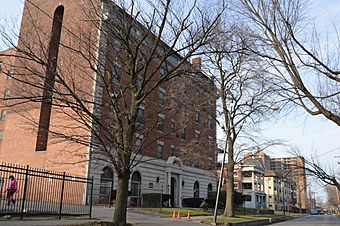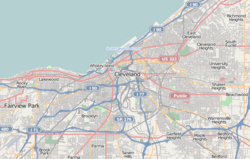Ansel Road Apartment Buildings Historic District facts for kids
Quick facts for kids |
|
|
Ansel Road Apartment Buildings Historic District
|
|

Ansel Road Apartments
|
|
| Location | 1588 to 1532 Ansel Road; 9500 and 9501 Wade Park Avenue; Cleveland, Ohio |
|---|---|
| Area | 13 acres (5.3 ha) |
| Architectural style | Colonial Revival, Mission Revival, Neoclassical, Renaissance Revival, Tudor Revival |
| NRHP reference No. | 08000589 |
| Added to NRHP | July 2, 1987 |
The Ansel Road Apartment Buildings Historic District is a special area in Cleveland, Ohio. It's full of old apartment buildings that are important to history. These buildings were mostly built between 1900 and 1949. This area was officially recognized as a historic district on July 2, 2008. It's now listed on the National Register of Historic Places.
Contents
History of the Ansel Road District
In 1897, a famous person named John D. Rockefeller gave a lot of his land to the city of Cleveland. This land became Rockefeller Park, a beautiful park with a stream called Doan Brook. Ansel Road was an important street next to this park. It was one of the first roads in the area. In 1907, it was paved and became a busy street near the park.
As Rockefeller Park grew, Ansel Road became a very popular neighborhood. Many large homes were built there, especially on the west side facing the park. In 1899, the Wade Park Avenue Bridge opened. A well-known architect named Charles F. Schweinfurth designed this bridge. It made it easier for people to get to the neighborhood.
Building the Apartment Homes
Between 1910 and 1928, several apartment buildings were constructed in the district. These buildings varied in size and style. The first one was The Overlook, built in 1910. It was a fancy three-story building with many rooms.
In 1914, The Parkcliff was built, which was similar in size. After World War I ended, building materials became easier to get. This allowed for more construction. The first part of the large Wade Chateau Apartments opened in 1921.
Two big apartment buildings, now called Regency Square Apartments, were built around a shared courtyard. Devon Hall, now Rockefeller Park Towers, was finished in 1926. It became an important building at the south end of the district. The Lynette, a smaller apartment building, was completed in 1928. This finished the unique collection of buildings in the district.
Notable Buildings in the District
Here are some of the important buildings you can find in the Ansel Road Apartment Buildings Historic District:
- Rockefeller Park Towers, 1588 Ansel Road: This six-story building was finished in 1926. It was designed by architect Herbert Bishop Beidler. It was first called Devon Hall and was a hotel for young women. Later, it was used by the Salvation Army to help girls. In 1961, the Alpha Kappa Alpha sorority bought it. They used it as a training center.
- The Parkcliff, 1580 Ansel Road: This luxury three-story apartment building was completed in 1914.
- The Overlook, 1568 Ansel Road: This luxury three-story apartment building was completed in 1910.
- Regency Square Apartments, 1560 Ansel Road: This four-story building was finished in 1925. Architect Max Weis designed it. A second building next to it opened in 1927.
- Linnette Apartments, 1552 Ansel Road: This four-story apartment building was completed in 1928.
- Wade Chateau Apartments, 9501 Wade Park Avenue: These two four-story apartment buildings were completed in 1921.
Images for kids
See Also
- National Register of Historic Places in Ohio





